Understanding Procurement and Contract Management
Added on 2023-01-11
23 Pages8780 Words77 Views
UNDERSTANDING
PROCUREMENT AND
CONTRACT
MANAGEMENT
PROCUREMENT AND
CONTRACT
MANAGEMENT
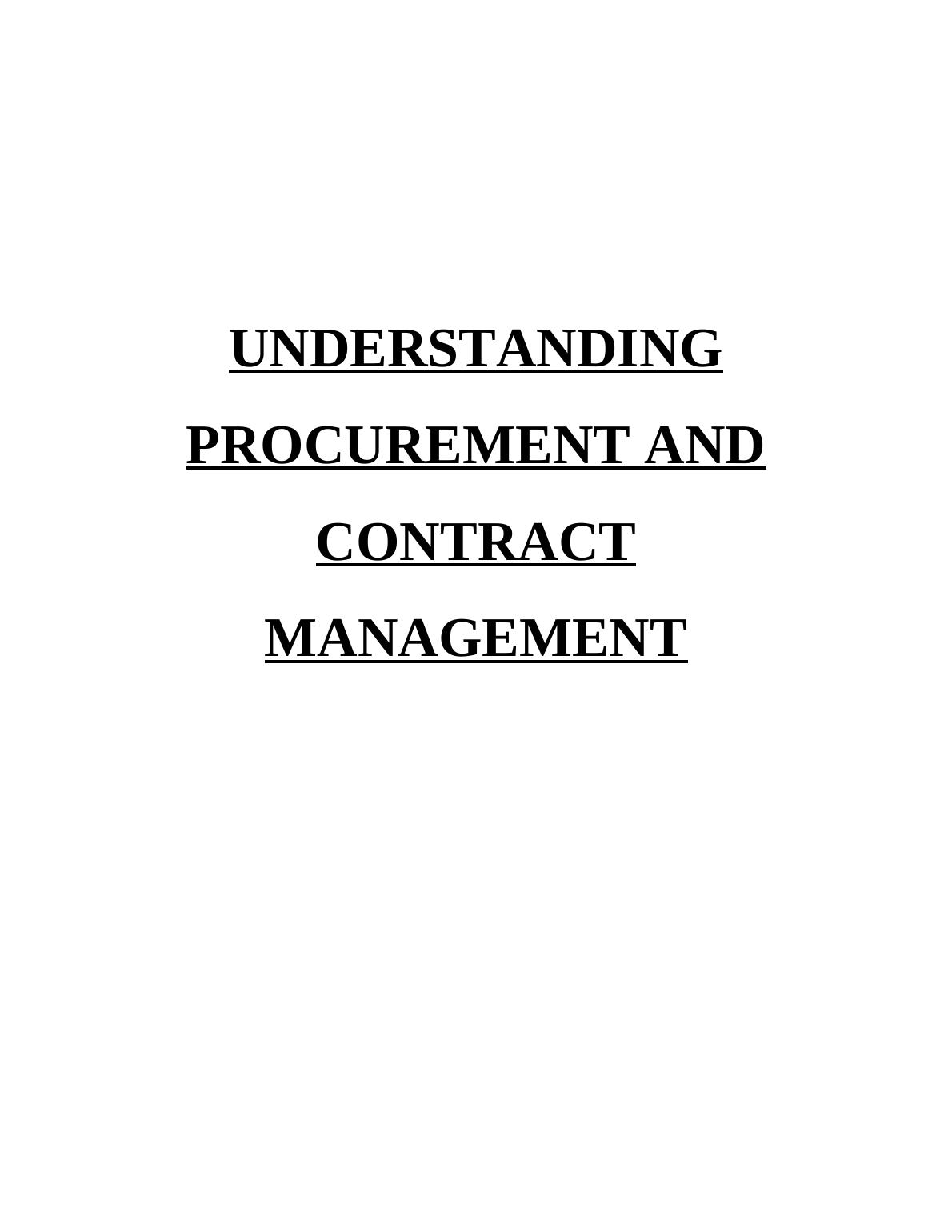
TABLE OF CONTENTS
INTRODUCTION...........................................................................................................................3
MAIN BODY..................................................................................................................................3
TASK 1............................................................................................................................................3
1.1 Principles of procurement......................................................................................................3
1.5How the Management of the Procurement Processare Organised..........................................5
1.6 Principles of Relevant Legislation.........................................................................................6
2.1 Different types of contracts...................................................................................................7
2.2 Advantages and disadvantages of different contracts over a range of goods and services316
.....................................................................................................................................................8
2.3 Selection of suitable procurement option............................................................................10
2.4 Selection of suitable contracts.............................................................................................10
TASK 2..........................................................................................................................................10
Procurement of hospitality services.......................................................................................10
Process and stage of procurement of goods and services..........................................................11
Fcators to be considered while choosing the bests succesfful tender..................................12
TASK 3..........................................................................................................................................13
3.1 Scope and specifications to be used in contract tendered....................................................13
3.2 Process used for specification..............................................................................................14
3.3 Input or output specification................................................................................................15
3.4 Scope of standard terms and conditions with advantages and disadvantages.....................16
TASK 4..........................................................................................................................................17
4.1 Elements which make up the cost of goods and services....................................................17
4.2 Factors to be considered behind deciding elements of procurement decision.....................18
CONCLUSION..............................................................................................................................20
REFERENCES..............................................................................................................................21
INTRODUCTION...........................................................................................................................3
MAIN BODY..................................................................................................................................3
TASK 1............................................................................................................................................3
1.1 Principles of procurement......................................................................................................3
1.5How the Management of the Procurement Processare Organised..........................................5
1.6 Principles of Relevant Legislation.........................................................................................6
2.1 Different types of contracts...................................................................................................7
2.2 Advantages and disadvantages of different contracts over a range of goods and services316
.....................................................................................................................................................8
2.3 Selection of suitable procurement option............................................................................10
2.4 Selection of suitable contracts.............................................................................................10
TASK 2..........................................................................................................................................10
Procurement of hospitality services.......................................................................................10
Process and stage of procurement of goods and services..........................................................11
Fcators to be considered while choosing the bests succesfful tender..................................12
TASK 3..........................................................................................................................................13
3.1 Scope and specifications to be used in contract tendered....................................................13
3.2 Process used for specification..............................................................................................14
3.3 Input or output specification................................................................................................15
3.4 Scope of standard terms and conditions with advantages and disadvantages.....................16
TASK 4..........................................................................................................................................17
4.1 Elements which make up the cost of goods and services....................................................17
4.2 Factors to be considered behind deciding elements of procurement decision.....................18
CONCLUSION..............................................................................................................................20
REFERENCES..............................................................................................................................21
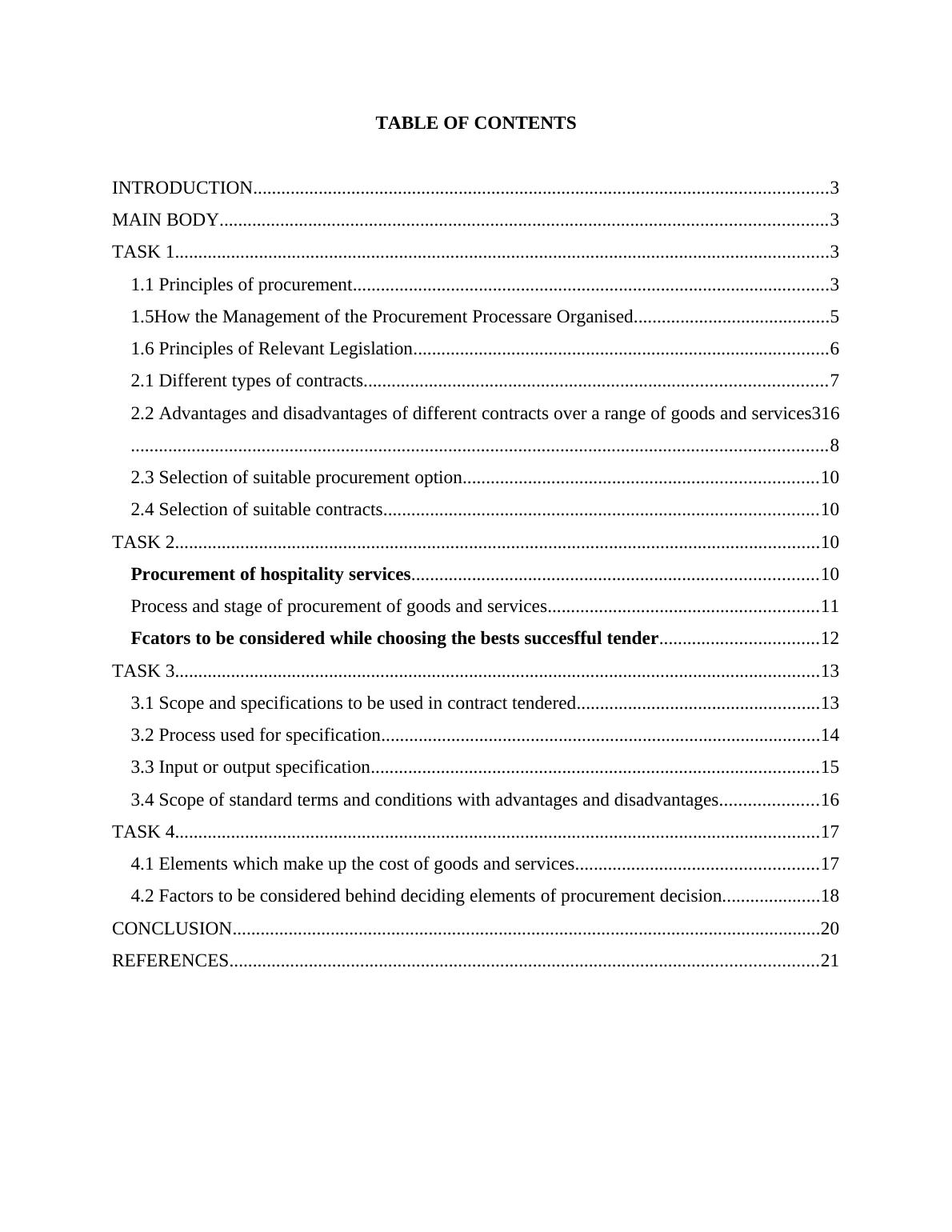
INTRODUCTION
Understanding procurement and contract management is one of the most important
paradigm which focuses to bring on rational functional strength for various business decisions
and expansion focus through which wider rational services can be attained within business
world. The report discusses various types of contracts and principles of procurement, cost and
various detailed explanation onto vivid factors of strengthened business factors which built on
wider rational paradigms to bring on higher relative expansion for gaining goodwill of service
among business cale customers. Report discusses the working fundamentals of Hilton hotel who
is working with best paradigms and rational functional roles to keenly bring on expertise and
choose best supplier company based on their relativity of roles. The report explains elements
advantage and disadvantages of inputs and output specification factors which further enable
companies to build synergy along with explanation on how it will best beneficial for company to
seek for further progression and rational functional strengthened to build procurement program
within business scenario (Tas, 2019).
MAIN BODY
TASK 1
1.1 Principles of procurement
Procurement is an agreement that is made between buyer and seller of products or raw material
to purchase it at specific prices for exchange of services. There are various principle of
procurement that needs to be followed by both buyer and seller while exchange goods and
services such as:
Right products: While buyer and seller exchange good and services between each others at
that time seller should ensure that right products are given to buyer so that it needs can be
satisfied in effective manner and firm can easily expand its business operation (Zarei, Carrasco-
Gallego and Ronchi, 2019.). Buyer should also information about specific quality of good that
will be required to sellers so that better procurement can take place between them.
Right price: Before procurement of products and services seller and buyer need to agree on
prices that will buyer pay for specific quantity and quality of goods and services. It can also be
stated that setting of price of products in advanced helps in reducing chance of conflict and
3
Understanding procurement and contract management is one of the most important
paradigm which focuses to bring on rational functional strength for various business decisions
and expansion focus through which wider rational services can be attained within business
world. The report discusses various types of contracts and principles of procurement, cost and
various detailed explanation onto vivid factors of strengthened business factors which built on
wider rational paradigms to bring on higher relative expansion for gaining goodwill of service
among business cale customers. Report discusses the working fundamentals of Hilton hotel who
is working with best paradigms and rational functional roles to keenly bring on expertise and
choose best supplier company based on their relativity of roles. The report explains elements
advantage and disadvantages of inputs and output specification factors which further enable
companies to build synergy along with explanation on how it will best beneficial for company to
seek for further progression and rational functional strengthened to build procurement program
within business scenario (Tas, 2019).
MAIN BODY
TASK 1
1.1 Principles of procurement
Procurement is an agreement that is made between buyer and seller of products or raw material
to purchase it at specific prices for exchange of services. There are various principle of
procurement that needs to be followed by both buyer and seller while exchange goods and
services such as:
Right products: While buyer and seller exchange good and services between each others at
that time seller should ensure that right products are given to buyer so that it needs can be
satisfied in effective manner and firm can easily expand its business operation (Zarei, Carrasco-
Gallego and Ronchi, 2019.). Buyer should also information about specific quality of good that
will be required to sellers so that better procurement can take place between them.
Right price: Before procurement of products and services seller and buyer need to agree on
prices that will buyer pay for specific quantity and quality of goods and services. It can also be
stated that setting of price of products in advanced helps in reducing chance of conflict and
3
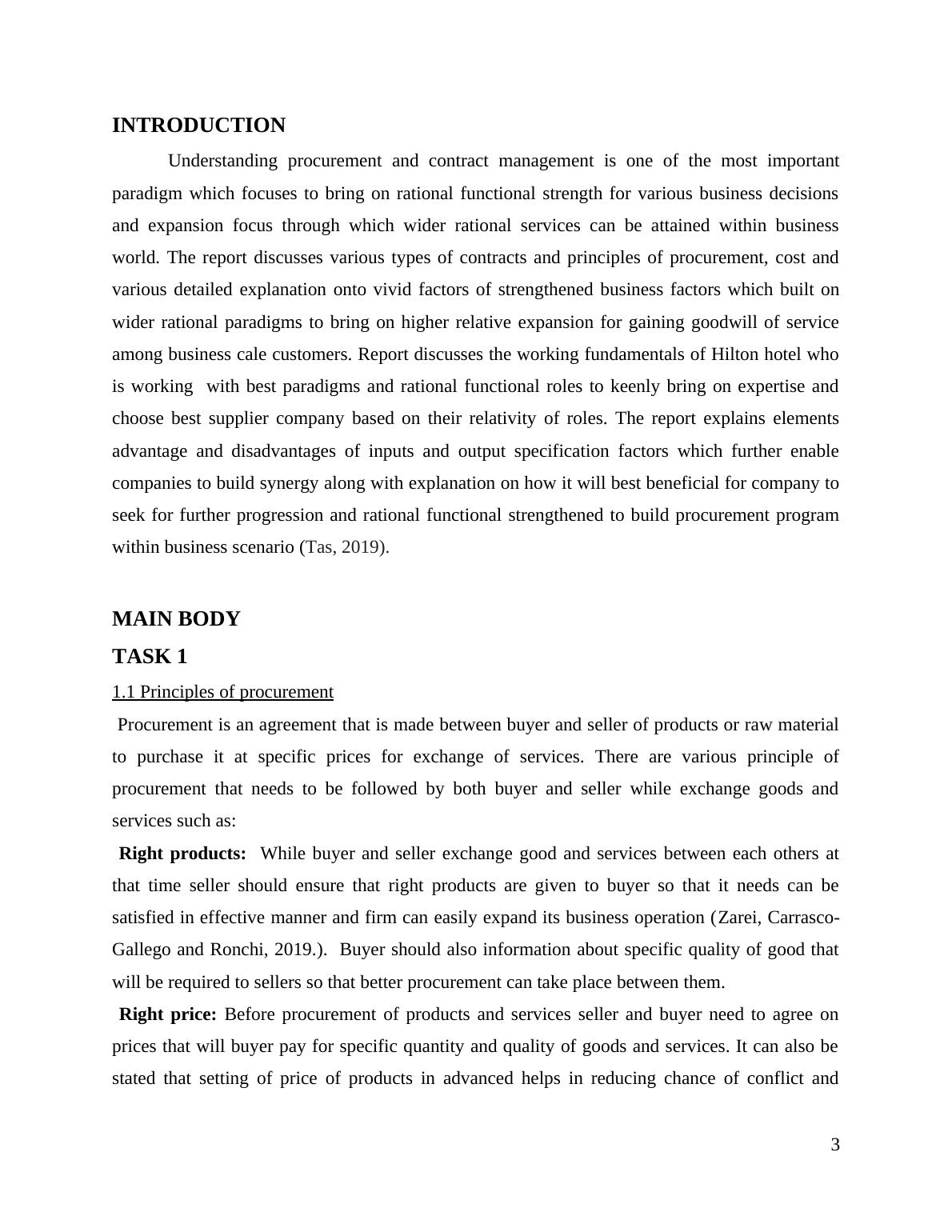
confusion between seller and buyers of goods and services. Buyer need to inform seller at what
prices it will buy at the same time seller need to aware buyer about specific price range for
particular service.
Transparent: It is one of the essential principle that need to be followed by both buyer and
seller of products is that transparency which means all information, provision regarding
procurement of products and services should be made in advanced and provided to service
provided. Therefore it helps in effective exchange of goods and helps in building strong trust and
belief between buyer and seller of products and services (Akhlaghi, Heaton and Chandani, 2019).
Both buyer and seller need to be transparent about services, products and prices or amount that
will be paid by buyer in exchange of goods and services purchased.
Effective: It state that various activities or function of procurement need to be performed as per
specific plan so that optimum or maximum benefit can be provided to buyer or company that
have purchased good and services for seller. Performance of activities as per need of buyer helps
in effective delivery or procurement of raw material and satisfaction of their needs. Therefore it
is responsibility of buyer to information activities that need to be performed while exchanging
good. While seller should ensure that all function are performed as per specification of buyers for
long term growth and survival of enterprise.
Fair and non discriminative: Both seller and buyer need to provide equal and fair treatment to
each other for effective exchange of services and satisfaction of customers need beyond their
expectancy.
Accountable: Seller should be accountable and responsible for process and outcome on the
other hand buyer should make payment on timely basis so that no delay or conflict can be caused
between them (Campbell, 2019). Both should be accountable and responsible for their
respective responsibilities so that goods can be exchanged effective between them.
It can also be stated that there is difference between procurement and purchase such as business
in order to fulfil needs of various individual procure goods and services at specific rates for
suppliers to make final products. Therefore it involves process of acquiring goods and services
for a company so that particular objectives can be achieved. On the other hand purchased
involves various task such as ordering and arrangement of payments for purchasing daily
products and services of company. It is more focused on price whereas procurement emphasis
more on values of products and services that are exchange between buyer and sellers.
4
prices it will buy at the same time seller need to aware buyer about specific price range for
particular service.
Transparent: It is one of the essential principle that need to be followed by both buyer and
seller of products is that transparency which means all information, provision regarding
procurement of products and services should be made in advanced and provided to service
provided. Therefore it helps in effective exchange of goods and helps in building strong trust and
belief between buyer and seller of products and services (Akhlaghi, Heaton and Chandani, 2019).
Both buyer and seller need to be transparent about services, products and prices or amount that
will be paid by buyer in exchange of goods and services purchased.
Effective: It state that various activities or function of procurement need to be performed as per
specific plan so that optimum or maximum benefit can be provided to buyer or company that
have purchased good and services for seller. Performance of activities as per need of buyer helps
in effective delivery or procurement of raw material and satisfaction of their needs. Therefore it
is responsibility of buyer to information activities that need to be performed while exchanging
good. While seller should ensure that all function are performed as per specification of buyers for
long term growth and survival of enterprise.
Fair and non discriminative: Both seller and buyer need to provide equal and fair treatment to
each other for effective exchange of services and satisfaction of customers need beyond their
expectancy.
Accountable: Seller should be accountable and responsible for process and outcome on the
other hand buyer should make payment on timely basis so that no delay or conflict can be caused
between them (Campbell, 2019). Both should be accountable and responsible for their
respective responsibilities so that goods can be exchanged effective between them.
It can also be stated that there is difference between procurement and purchase such as business
in order to fulfil needs of various individual procure goods and services at specific rates for
suppliers to make final products. Therefore it involves process of acquiring goods and services
for a company so that particular objectives can be achieved. On the other hand purchased
involves various task such as ordering and arrangement of payments for purchasing daily
products and services of company. It is more focused on price whereas procurement emphasis
more on values of products and services that are exchange between buyer and sellers.
4
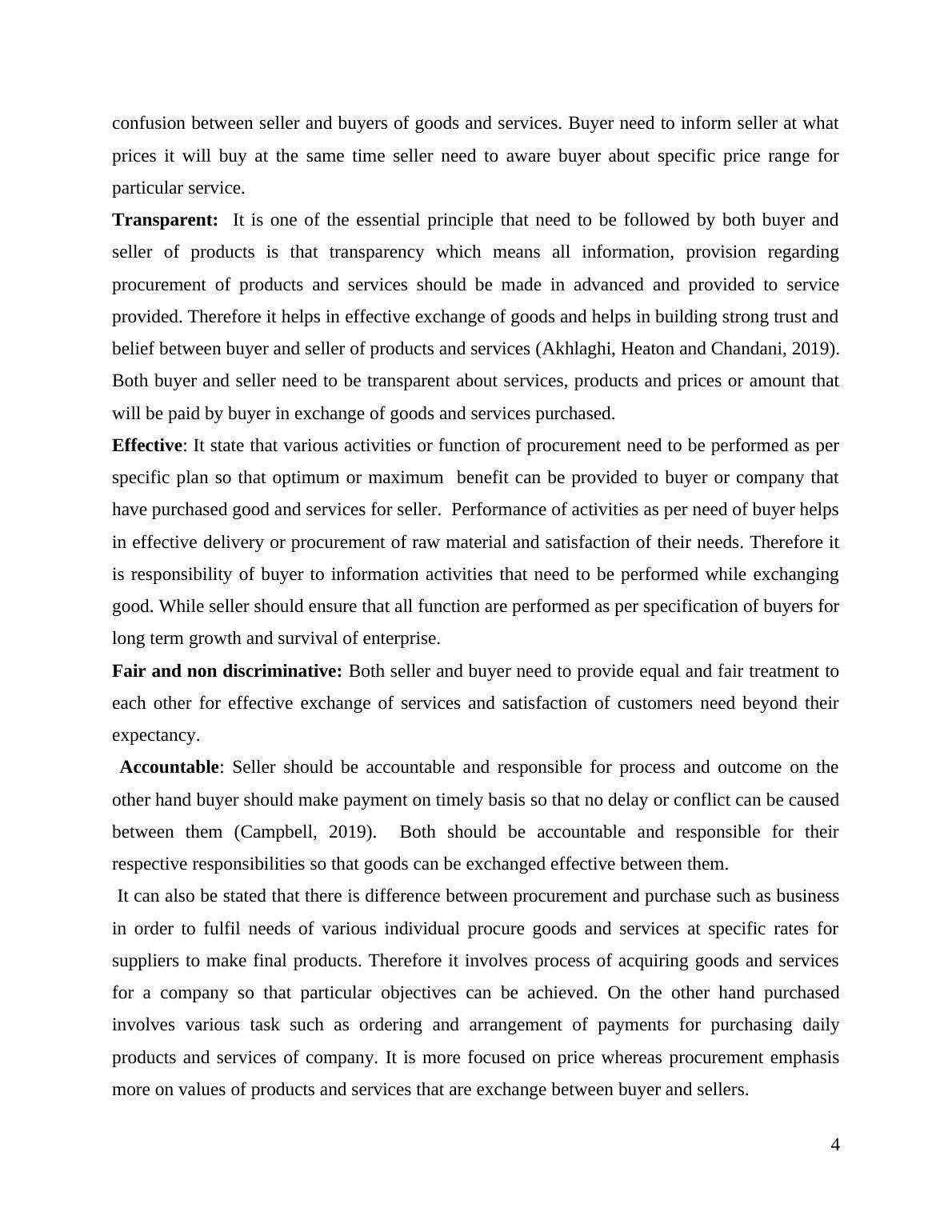
1.5How the Management of the Procurement Processare Organised
For the overall procurement process within a business organisation to be successful in its
varied functions, the management of the procurement process needs to be effectively organised
within the organisation in order for the procurement operations to be conducted effectively and
productively. For the effective management of the procurement process in business
organisations, the individual operations and functioning or roles of all employees and operational
departments in the business organisation needs to be effectively organised in relation to the
procurement process (Lawal, 2016). The roles of the employees engaging or taking part in the
procurement process needs to be effectively organised based on their functions and operations
towards the procurement process. The various roles of employees organised and managed as part
of the procurement process are as follows:
Specifier: A specifier is an employee within the business organisation that takes part in the
procurement process of the business by identifying and assessing the types of materials or
technologies that are required by the business to be procured from external markets.
Procurement Manager: The procurement manager is the head of the purchasing department
within the business organisation and is responsible for creating accurate and relevant
procurement strategies and identifying deals that are cost effective towards the procurement
process.
Purchasing Agent: Purchasing Agent is an employee within the business organisation who is
responsible for the preparation of all the purchasing orders. This employee compares requisitions
to purchase orders with the intention to assess whether the quantities of products procured are
adequate for the business’s needs or not.
Purchasing Administrative Agent: These employees within the purchasing department of the
business evaluate the various vendors and suppliers of the business organisation in order to
identify which vendor or supplier can the business organisation commence with in relation to
their procurement operations in order for these to be conducted successfully, while maintaining
optimum profitability.
Budget Holder:This are employees within the finance department of the business organisation
and these are responsible for saving as much financial resources as is possible out of the
allocated procurement budget allotted for the procurement operations of the business.
5
For the overall procurement process within a business organisation to be successful in its
varied functions, the management of the procurement process needs to be effectively organised
within the organisation in order for the procurement operations to be conducted effectively and
productively. For the effective management of the procurement process in business
organisations, the individual operations and functioning or roles of all employees and operational
departments in the business organisation needs to be effectively organised in relation to the
procurement process (Lawal, 2016). The roles of the employees engaging or taking part in the
procurement process needs to be effectively organised based on their functions and operations
towards the procurement process. The various roles of employees organised and managed as part
of the procurement process are as follows:
Specifier: A specifier is an employee within the business organisation that takes part in the
procurement process of the business by identifying and assessing the types of materials or
technologies that are required by the business to be procured from external markets.
Procurement Manager: The procurement manager is the head of the purchasing department
within the business organisation and is responsible for creating accurate and relevant
procurement strategies and identifying deals that are cost effective towards the procurement
process.
Purchasing Agent: Purchasing Agent is an employee within the business organisation who is
responsible for the preparation of all the purchasing orders. This employee compares requisitions
to purchase orders with the intention to assess whether the quantities of products procured are
adequate for the business’s needs or not.
Purchasing Administrative Agent: These employees within the purchasing department of the
business evaluate the various vendors and suppliers of the business organisation in order to
identify which vendor or supplier can the business organisation commence with in relation to
their procurement operations in order for these to be conducted successfully, while maintaining
optimum profitability.
Budget Holder:This are employees within the finance department of the business organisation
and these are responsible for saving as much financial resources as is possible out of the
allocated procurement budget allotted for the procurement operations of the business.
5
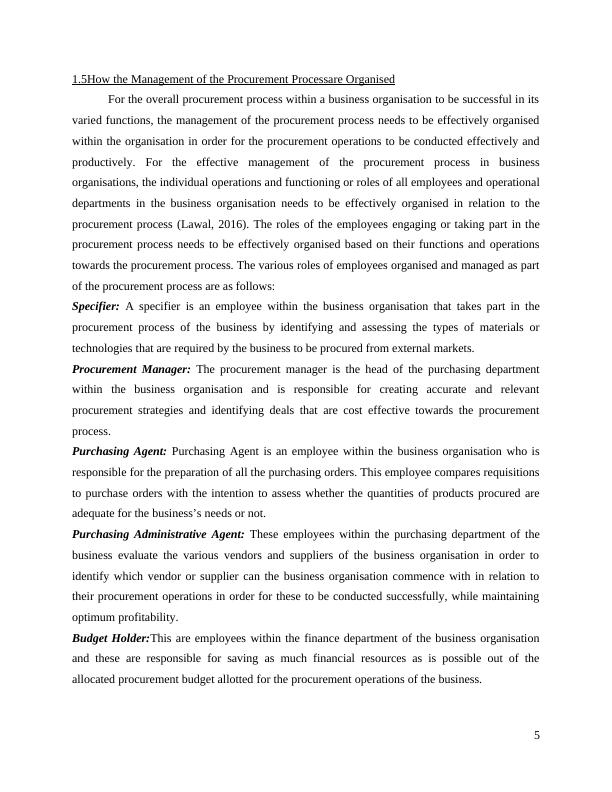
For the procurement operations of a business organisation to be effectively successful,
the powers of the various employees engaged in the procurement process needs to be effectively
separated from each other while also providing relevant authority to the individuals engaged,
based on their position within the effective hierarchical chain of command of the business
organisation. The management needs to ensure that all powers vested within various employees
taking part in the procurement process are separated from one another in order to perform the
procurement operations successfully (Del Río, 2017). The management also needs to ensure that
there are levels of authority present such as heads of individual departments such as purchasing,
procurement, supply chain, finance etc. in addition these department’s individual employees,
while making sure that all powers between these are separated accordingly. For the overall
procurement operations of a business organisation to be successful and productive, the
management of this should also be organised in such a way that it encourages the operations of
record keeping from all employees taking part in the procurement process. This allows for
dedicated records that can be inferred by the managers, whenever their comes a difficulty or
hurdle in the procurement operations of the business organisation, effectively increasing the
efficiency of the procurement operations of the business.
1.6 Principles of Relevant Legislation
There are several legal requirements and legislations which the business organisation and
its employees have to adhere to and respect in relation to their procurement operations. Major
principles of relevant legislations are as follows:
EU Procurement Process:The EU procurement process law requires that all public bodies open
procurement contract that offer a higher value and opportunities to bids coming from within the
European union. This also requires them to run procurement competition that is fair and
transparent to all in order to select the correct winning bid.
Official Journal of the European Union (OJEU): The OJEU is a dedicated journal that values
all the public sector tenders above a certain financial threshold. This also covers projects and
organisations that gain needed money for tender from the public. It consists of two series L and
C.
Office of Government Commerce (OGC): OGC was a regulating office of UK government that
supported the procurement and acquisition operations of the public sector through process
guidance, policies and negotiations of provision frameworks (Stritch,Bretschneider and Hsueh,
6
the powers of the various employees engaged in the procurement process needs to be effectively
separated from each other while also providing relevant authority to the individuals engaged,
based on their position within the effective hierarchical chain of command of the business
organisation. The management needs to ensure that all powers vested within various employees
taking part in the procurement process are separated from one another in order to perform the
procurement operations successfully (Del Río, 2017). The management also needs to ensure that
there are levels of authority present such as heads of individual departments such as purchasing,
procurement, supply chain, finance etc. in addition these department’s individual employees,
while making sure that all powers between these are separated accordingly. For the overall
procurement operations of a business organisation to be successful and productive, the
management of this should also be organised in such a way that it encourages the operations of
record keeping from all employees taking part in the procurement process. This allows for
dedicated records that can be inferred by the managers, whenever their comes a difficulty or
hurdle in the procurement operations of the business organisation, effectively increasing the
efficiency of the procurement operations of the business.
1.6 Principles of Relevant Legislation
There are several legal requirements and legislations which the business organisation and
its employees have to adhere to and respect in relation to their procurement operations. Major
principles of relevant legislations are as follows:
EU Procurement Process:The EU procurement process law requires that all public bodies open
procurement contract that offer a higher value and opportunities to bids coming from within the
European union. This also requires them to run procurement competition that is fair and
transparent to all in order to select the correct winning bid.
Official Journal of the European Union (OJEU): The OJEU is a dedicated journal that values
all the public sector tenders above a certain financial threshold. This also covers projects and
organisations that gain needed money for tender from the public. It consists of two series L and
C.
Office of Government Commerce (OGC): OGC was a regulating office of UK government that
supported the procurement and acquisition operations of the public sector through process
guidance, policies and negotiations of provision frameworks (Stritch,Bretschneider and Hsueh,
6
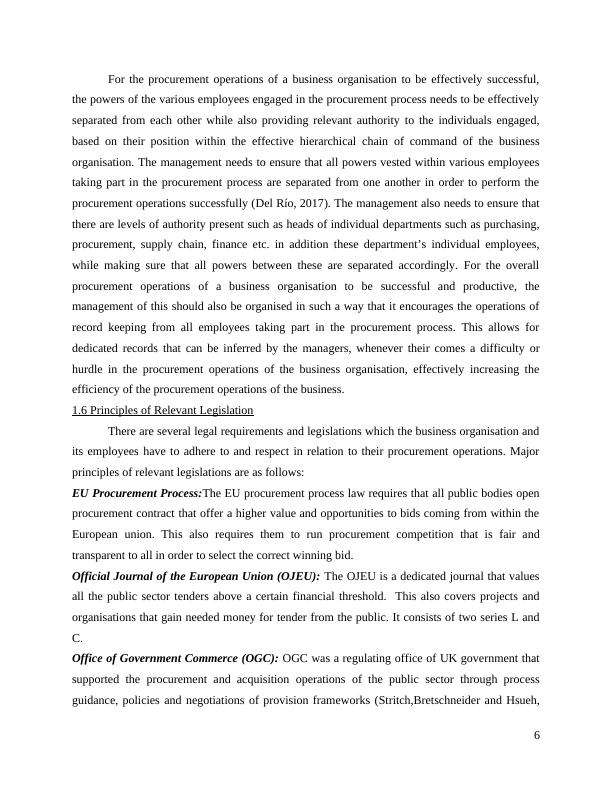
End of preview
Want to access all the pages? Upload your documents or become a member.
Related Documents
Some of the procurement methods for a buyerlg...
|9
|2837
|14
Outsourcing/Procurement Managementlg...
|20
|790
|64
Assignment: International Marketing Managementlg...
|18
|5438
|290
TASK 11 1.1 Legal Rules on Implied Termslg...
|15
|5457
|208
Business Law Assignment | Intellectual Property Rightslg...
|16
|5318
|118
Assignment of Contract - Law of Contractslg...
|9
|2294
|297